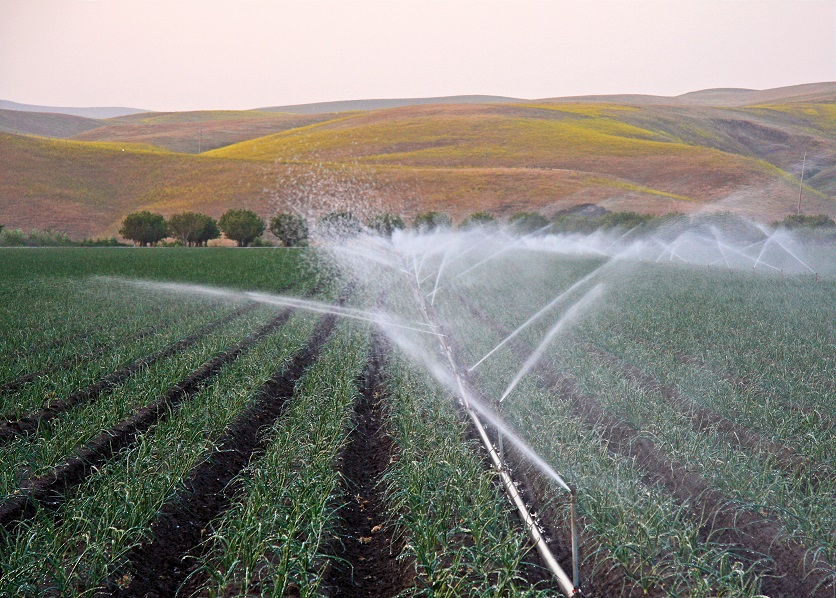Hudson Bennett is a law student in the HLS Food Law & Policy Clinic and a guest contributor to this blog.
What’s going on?
The United States agriculture industry is wasting water at a crippling rate. Irrigation efficiency sits at around 60-70%, and domestic aquifers are being depleted at a rate significantly faster than they can recover. In other words, the industry uses way too much water at a far too low efficiency rate. Here are some numbers that the massive demand for produce combined with lower-than-possible efficiency result in: beef uses approximately 1,847 gallons of water per pound produced; rice, 650 gallons per pound; wheat, 130 gallons per pound; soybeans, 240 gallons per pound; sugar, 400 gallons per pound; and coffee, a whopping 2,500 gallons per pound. All told, that adds up to 2 quadrillion gallons of water used globally by the agriculture industry every year. That’s a 2—with 15 zeros after it.
Why does it matter?
Water use in agriculture accounts for more than 85% of the United States’ water usage. Only 0.5% of the Earth’s water is freshwater, and studies indicate that roughly half of the freshwater basins in the United States won’t have enough water in them to meet monthly water demands by 2071. By 2060, several regions of the United States are likely to face water scarcity. Water scarcity could cripple agriculture, in addition to the immediate effects: dehydration, hygiene issues, health problems, and exacerbated inequality. If water becomes scarce, like any other resource, it will only become more expensive.
This is already an issue for many around the world: 4 billion people experience severe water scarcity for at least one month each year, and 700 million people are projected to be forced into migrating because of intense water scarcity by 2030. In other words, habitable locations will face widespread overcrowding, in addition to the millions of people facing inhumane living conditions and death.
Can the agriculture industry do anything to change the situation?
Yes. There are a lot of different ways the agriculture industry can decrease their water usage. A few that the USDA identifies are:
- Updating irrigation systems: irrigation pipelines carry water more efficiently, and replacing traditional flood irrigation systems with pipelines and gravity sprinkler systems can halve water usage.
- Utilizing cover crops: invest in plants that are used to improve soil health, increase water availability, and a plethora of other benefits.
- Implementing no-till farming: take advantage of tools that create narrow furrows to keep crop residues on the surface and result in higher water capacity than traditional tilling and plowing techniques.
A shift in focus on crops, broadly, would also help. Meat products require more water than plants, and some plants require more water than others.
Can I do anything to help?
You can do a lot to help. First and foremost, think about your diet—that burger that tastes so good takes between 4,000 and 18,000 gallons to arrive in front of you. Do some research and think about your water footprint. Wasting food goes into this, too—imagine that you’re throwing out thousands of gallons of water when you’re tossing away that perfectly good package of deli meat. Next, contact your U.S. or state representative and tell them to support some of the bills that are being considered now to provide funding to help water conservation.
Which bills, specifically?
Great question. There’s a lot floating around out there on water conservation, and it’s not all agriculture. Colorado is considering a bill that requires conservation techniques in oil and gas operations. California passed a Water Conservation Act that requires agricultural water suppliers covering more than 25,000 acres to submit a plan for water management. Federally, there’s a bicameral bill that is meant to incentivize water conservation. Make your voice heard supporting it by calling your representative or senator and letting them know of its importance!
The views and opinions expressed on the FBLE Blog are those of the authors and do not necessarily reflect the official policy or position of FBLE. While we review posts for accuracy, we cannot guarantee the reliability and completeness of any legal analysis presented; posts on this Blog do not constitute legal advice. If you discover an error, please reach out to contact@farmbilllaw.org.


